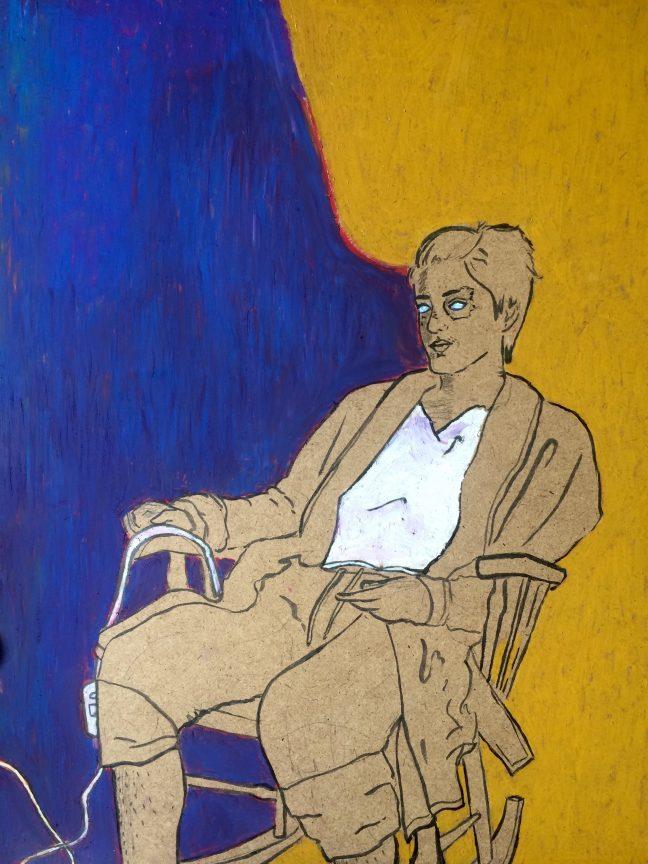Untangling “gender” in different ways is a goal that the artist Alaura Borealis has been working on throughout their ongoing project.
Borealis, a social artist and University of Wisconsin alumn, will showcase their exhibit, “Embodying the Shadow” at the Black Locust Café during December and January. The exhibition is part of their ongoing social project, “Season of Shadows.”
Borealis has been interviewing and working with queer individuals about gender and their experiences. Together, they have been collaborating to create metaphors for such gender experiences that may be difficult to explain.
Being a social artist, Borealis does a lot of work in and with [the] community and other people, they said. As such, the medium for creating their art can vary much depending on the artist’s preferences and goals.
“In some cases, it’s really performative and in many cases, it doesn’t stick to a particular discipline. I’ve done things ranging from drawing to sculpture to teaching,” Borealis said.
They also explain that their inspiration to be a social artist has primarily derived from personal experiences within their community.
Borealis’s commitment to their community inspires them to create their artwork. Life experiences as a queer person, housing insecurities and chronic pain also inspire the artwork, they said.
Collaborating with Queer Pressure has brought Borealis to be featured within Black Locust Café. Sarah Akawa, a member of Queer Pressure, has been partnering with Borealis throughout the “Season of Shadows” project in other ways. Recently, they have worked together on a party called Queer Shadows, which occurred around Halloween.
“By partnering with Sarah at the Queer Shadows party, we were exploring what it means to get to play with our expression and to get dressed up with friends for the fun of it,” Borealis said. “With Embodying the Shadow, we’re partnering to articulate an entirely different side of the shadows project. In particular, this new partnership is about the intersection of disability and gender.”
Throughout their artistic career, Borealis describes their creative process as one that attempts to answer a question or problem they have at the time.
Once Borealis finds a question that needs attention, they research the topic over a period of time to learn more. With the “Season of Shadows” exhibit, they are interested in the non-binary gender experience and how people articulate certain aspects of that experience, they said.
To learn and uncover more about the non-binary experience, Borealis has been interviewing queer peers about gender and other life experiences to obtain a variety and large quantity of information. From there, they take the certain themes that arose during the interviews and express the information through performance, workshops and writing, they said.
The process is trans-disciplinary, Borealis said. In other words, it is a combination of behind the scenes research as well as working with other people to explore whatever the question is.
Borealis will be working on this social project for about a year in a variety of different ways. In an “organic” manner, then, a new question will surface, and they will work through it in a similar way.
Having been featured in galleries before, Borealis describes the experience of viewing their own art on display not only with excitement, but a further way of examining their progression in answering the question.
“I think it’s another opportunity to explore the question or problem at hand. I haven’t actually been doing a lot of drawing lately and so an opportunity to show work on the walls of the gallery space is actually really different to what I have been doing,” Borealis said.
The artist has been working on a lot of performance, writing and conversation-based mediums lately, so this gallery is “another part of the creative research.”
Hearing from other queer peers in constructing this ongoing project has been a very interesting way to compile the pieces.
“It’s really obvious that we all have very different life experiences and different ways of articulating our experience,” Borealis said. “We’re really digging into a lot of different aspects of our lives to better understand this thing we call gender.”
For Borealis personally, they have been thinking of gender as a shadow, or as a “shadowy thing” that tends to shift depending on one’s perspective.
Like a shadow, gender may be gone at certain moments and very visible at other times. With the exhibition and the entire project related to shadows, some perceptions of gender may be visible more often than others.
Dan Ramirez’s explores light and faith through ‘Certainty and Doubt’
Borealis also said much of the work is “really an image of me by myself.” As part of a project where they have been collaborating with other people, it has been interesting to reflect on the moments that Borealis spends alone.
In the future, Borealis hopes to find something new with other people. Unsure of what it will be, they emphasize that it doesn’t have to be something extraordinary, but something true.
The opening reception for the exhibition will be held Dec. 7 from 5-9 p.m. at the Black Locust Café. The work will also be at the Café for the months of December and January.


